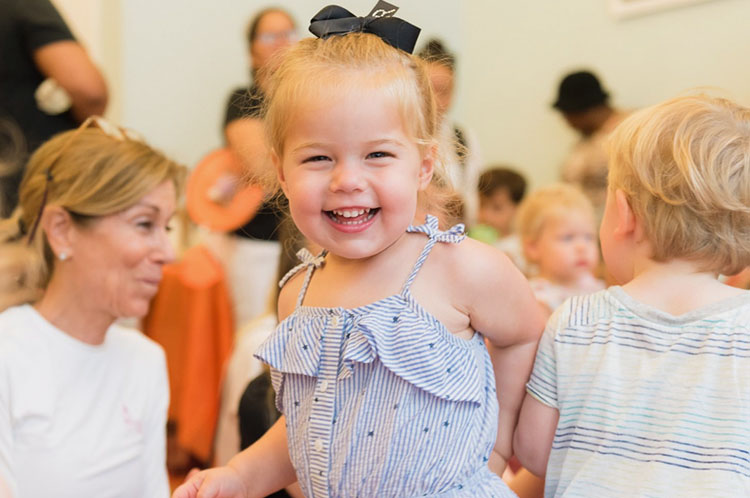In our Early Childhood Center, we encourage creativity, we teach with passion, and we support your family through everything.
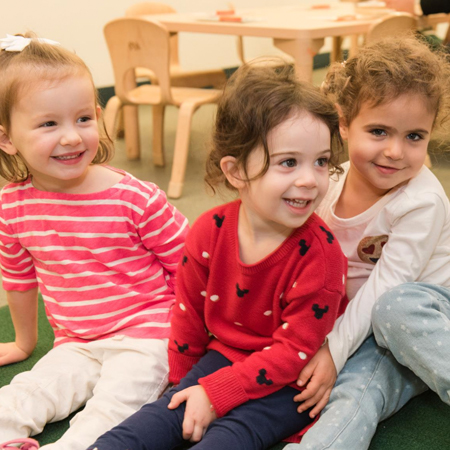
How Children Learn
Early childhood is a unique time in which the capacity for learning is remarkably expansive. Young children’s brains have an unparalleled ability to take in new information and make sense of a world filled with novel experiences and potential discoveries. During these early years, children notice far more detail about the world and have a more heightened ability to think creatively than at any other time in development. During the first five years of life, we witness a tremendous amount of physical, mental, and emotional development. Children learn to talk, walk, run, jump, and climb. They also learn how to build friendships and how to solve problems. All of these skills, which are developed during linguistic, motor, and social experiences of the early years, lay the foundation for complex tasks, such as reading and writing, which will emerge later. Read More
We encourage children’s play and help them extend their thinking and skills by providing materials rich in educational value and open possibility. By offering experiences that prompt children to notice new details and grapple with increasingly complex problems, we encourage them to revisit and revise old ideas as their understandings become more sophisticated.
We also strive to develop a curriculum that is responsive to the particular curiosities and interests children reveal through their play. Through emergent curriculum, children and adults become more open to learning because it is grounded in a topic that sparks passion. Teachers attend closely to children’s play, and as particular themes or questions emerge, we weave these into our planning. Show Less
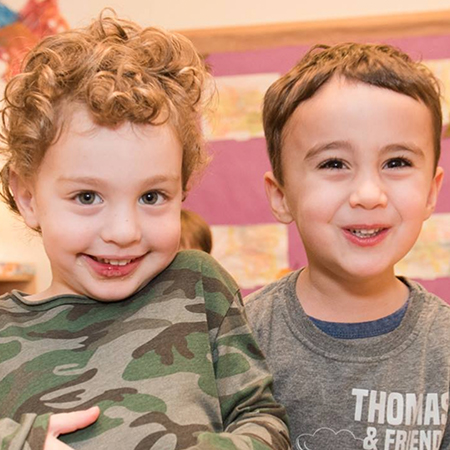
Academic Readiness
Many of the tasks children will engage in as they move into elementary school are not tasks that come naturally to the human brain. Instead, they require us to draw upon every area in the mind in order to coordinate complex neurologic activity that extends beyond what any one brain region evolved to do. Read More
Additionally, the tasks children will be asked to engage with throughout their educational lives will require highly developed social-emotional skills and an abiding commitment to learning, even when it is challenging. Therefore, we see social skills, including the capacity to self-regulate and to work collaboratively with others, as essential to later academic success. We also view fostering a love of learning as one of our greatest responsibilities. Often, learning presents challenges and frustrations, but when children experience the thrill hat comes with persisting through both exciting discoveries and moments of exasperation to arrive at a new understanding, they develop the roots that nourish learning throughout a lifetime.
We recognize it is important for young children to develop a foundation in the specific skill sets and content knowledge they will encounter in kindergarten in order to enter this next phase of learning with confidence and excitement. Therefore, our teachers pay close attention to assessing children’s skills, with a deep knowledge of age appropriate expectations, and they scaffold the development of skills by integrating them into meaningful, playful activities. When skills are embedded in play, children experience far more motivation to persist and develop mastery than when they are practiced in isolation. Additionally, we have a robust team of experienced, knowledgeable specialists, who work with teachers, children, and parents to develop a comprehensive understanding of each child’s learning style and development, as well as to support parents in accessing additional support whenever a child may need a little extra help.
It is our goal for each child to graduate from the ECC confident, eager to learn, and possessing a willingness to take the risks that grow from feeling understood and valued. Show Less
Flexibility within Structure
In order to explore, children must first feel secure in their environment. This sense of security is established through trusting relationships, consistent expectations, and the predictability of routines. Therefore our first priority at the beginning of school is to gently ease children into the classroom setting, allowing them to get to know their teachers and peers and to become familiar with the rules and rhythms of the school day. Once children feel confident that they will be well cared for at school and can ground themselves in knowing what will come next and what will be expected of them, they are more free to experiment, deepen relationships, test the limits of their development, and make new discoveries. Read More
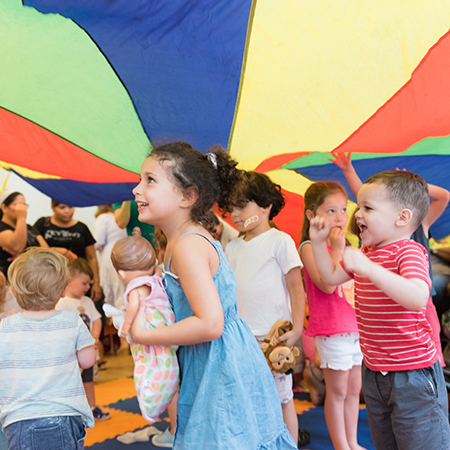
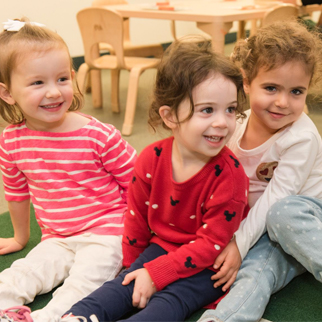
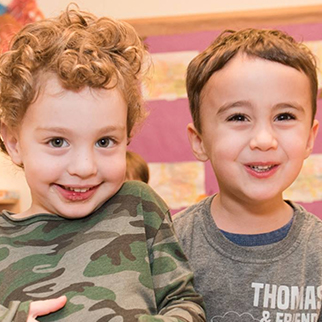
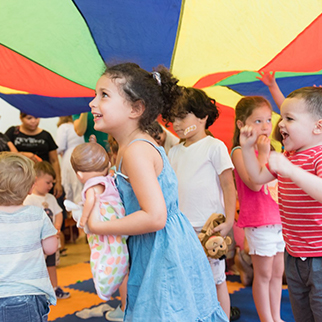
Jewish Values & Experiences
At JCP, we seek to provide children with rich experiences of Jewish values, stories, and rituals that are woven into their daily interactions and curriculum. We view Jewish learning, not as a distinct thread that surfaces only on Shabbat and holidays, but rather as integral to the fabric of the classroom community throughout the year. Read More
As we gather for Shabbat each week, we bring the tables together so we can sit as one group; lowering the lights and joining hands, the children experience a feeling of calmness and connection. Whether they practice this ritual at home and know the prayers by heart, or only encounter it in the classroom, the experience of togetherness and peace is a powerful touchpoint at the end of a busy, stimulating week. To further the children’s experience of connection through this shared ritual, each week one family joins the class for Shabbat, bringing something unique from their own home life to share. Some families may choose to share something that is directly connected to the rituals of Shabbat, such as the family kiddush cup, while others may choose to share a favorite story, song, or activity. In each case, we focus on learning about one another and embracing both our similarities and differences. Show Less
The Role of Family
Family is at the heart of our mission as a Jewish organization. In our welcoming community, both within and beyond the ECC, we seek to create experiences in which families can find connection and support. We bring people together through community events and personal milestone moments and celebrations. Through our rich programming for all ages, we hope families continue to remain engaged with JCP, even after children have graduated from the ECC. Read More
A School for Everyone
The ECC is a pluralistic Jewish learning community, dedicated to supporting the development of identity and fostering a spirit of inclusion from the earliest years. We believe in the inherent value of each individual. Every day our children learn to appreciate similarities, to embrace differences, and to protect and advocate for others, both within and beyond our walls. Read More
Each day of a young child’s life brings new experiences and new information. As children work to make sense of all they are experiencing, they become experts in sorting and classifying. Just as the young child learns to identify and categorize shapes, colors, and animals, so too does the mind begin to create categories and assumptions that organize experiences of people. The very trait that allows young children to learn more rapidly than at any other time in their lives also makes them vulnerable to the seeds of stereotype and bias. Research tells us that unless we actively work to expand their thinking, many of these seeds take root in a child’s consciousness by age five. Therefore, we see it as our responsibility to model openness in discussing diversity and to create classroom environments in which children feel comfortable asking questions, challenging their own assumptions, and complicating their understandings. Learning at JCP is an experience of embracing complexity.
Just as we support children in learning to express and take pride in their individuality, we also actively foster a commitment, not only to appreciate, but to stand up for others. Young children are acutely attuned to issues of fairness. We encourage them to articulate their observations about justice, whether in the block corner or in the world outside the classroom, and to view themselves as allies and problem solvers. Through these early experiences we empower children at JCP to become active, responsible, and caring citizens in a diverse world. Show Less

